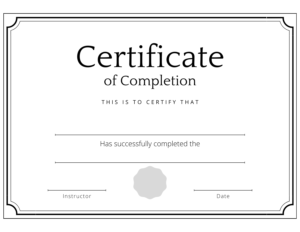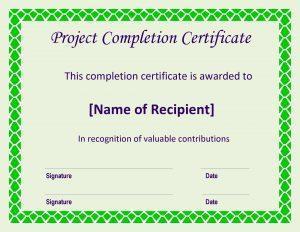Description
A Certificate of Project, or certificate for a project is a formal document that acknowledges the completion, achievement, or proficiency related to a specific project. It serves as proof that an individual or team has met certain criteria, milestones, or standards. Here are the key aspects of a certificate for a project:
- Purpose: It is primarily issued to recognize the hard work, dedication, and expertise an individual or team has shown towards the successful completion of a project.
- Components:
- Title: Usually something like “Certificate of Completion” or “Certificate of Achievement.”
- Recipient’s Name: The name of the individual or team receiving the certificate.
- Description: A brief outline of the project or the specific achievement being recognized.
- Issuing Authority: The name of the organization, company, or individual issuing the certificate.
- Date: The date the certificate is issued.
- Signature: The signature of the authorized person from the issuing authority.
- Seal or Logo: The official seal or logo of the issuing organization, if applicable.
- Types (Each has their own page with descriptions and samples):
- Certificate of Project Completion: Acknowledges that an individual or team has completed all requirements of a project.
- Certificate of Achievement: Recognizes special achievements during the course of the project.
- Certificate of Participation: Acknowledges that an individual or team participated in the project, but doesn’t necessarily indicate completion or achievement.
- Benefits:
- Recognition: Validates the skills and efforts of the recipient.
- Motivation: Encourages individuals or teams to continue their hard work and dedication.
- Verification: Acts as proof of involvement or completion, which can be useful for career advancements or for clients seeking verification of past work.
- Credential: Can be added to a portfolio or resume as evidence of expertise or experience.
- Usage:
- In corporate settings, certificates are often given to employees or teams upon the completion of significant projects.
- In educational settings, students might receive a certificate upon completing a significant project or research.
- Freelancers or contractors might receive a certificate from clients as proof of their work, which they can then showcase to potential clients in the future.
It’s important to note that while a certificate for a project is a great way to recognize and validate work, it’s not a legally binding document like a certification from a professional body. However, it still holds value as a testament to an individual’s or team’s dedication and skill.

Certificate of Project Completion
A Certificate of Project Completion is a pivotal document in the realm of project management, marking the formal culmination of a project and attesting to its successful execution and adherence to stipulated parameters. This document not only symbolizes the end of a project but also serves as a vital record, reflecting precise details about the project’s initiation, execution, and conclusion.
What it is
A Certificate of Project Completion acts as a formal declaration that asserts the successful completion of a project, aligning with predefined specifications and client expectations. It serves as a conduit between project closure and client handover, effectively signaling the transition of the project from the development team to the client or stakeholder.
A Certificate of Project Completion typically includes the following:
1. Project Title and Description: A brief yet clear outline of the project, encapsulating its essence and primary objectives.
2. Date of Commencement and Completion: These indicate the timeline within which the project was executed and brought to fruition.
3. Participating Parties: This includes the names and details of all major stakeholders, such as the client, contractor, and project manager.
4. Cost Details: Often, the certificate encapsulates the total expenditure incurred during the project, confirming adherence to the budgetary outline.
5. Compliance Confirmation: A statement affirming that the project adheres to all agreed-upon specifications and quality standards.
6. Approval Signatures: Sign-off from the relevant authoritative figures, such as the project manager and client, validating the information presented.
7. Additional Notes: Any pertinent details or observations that warrant inclusion, offering added insights into the project.
Purpose and Usage
– Client Assurance: The certificate provides the client with tangible assurance of the project’s successful completion and compliance with established parameters.
– Legal and Financial Clarity: It may serve as a reference in any subsequent legal or financial discussions, offering a clear record of project details and agreements.
– Future Reference: For project teams and organizations, the certificate provides a documented history of their completed projects, which can be utilized for future reference or to demonstrate capabilities to prospective clients.
– Marketing and Portfolio Building: Often, details from the Certificate of Project Completion can be utilized (with client permission) in building a portfolio or showcasing organizational competencies in marketing materials.

A Certificate of project completion can add value to any program—from kindergarten classrooms to management meetings, from Boy Scout troops to martial arts studios. It is often offered for …
- project management programs
- professional development courses
- advanced program training
- short term training
- various degree and certificate programs
Besides this, the certificate of project completion also is also provided in software skills, technical skills, Business Entrepreneurship, Artist and design course. The certificate must mention the following details.
- Date of project commencement
- Date of the work completion
- The cost paid
- Name of the principal parties involved in the project.
- Nature of the work – Commercial building, residential or road construction project,
- Signature and Name of the signing authority
- Certificate issued date